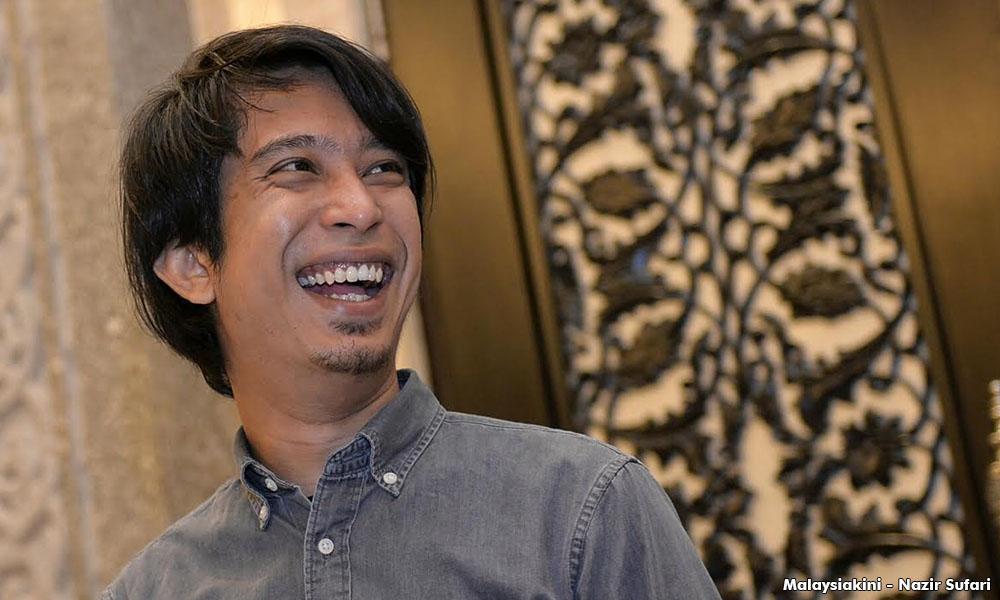
SPECIAL REPORT | In 2013, excitement and tension were boiling over just before the 13th General Election. Large turnouts at rallies reflected people’s demand for change, and a real change of political regime felt close.
The results, however, turned off many voters, especially the progressive youth who thought “Ini kalilah” (this time) could be realised in 2013.
The voice of youth is often seen as enthusiastic, progressive, and empowered to imagine a better future for the nation.
However, with the 14th General Election around the corner, and with the political restructuring process becoming more obscured, many feel disillusioned and apathetic.
There is even talk about abstaining from voting.
How will they blaze a trail through the current political and economic climate and define “politics” in their own terms?
Five young activists elaborate on what they expect to happen in the next election.
Adam Adli (28, Penggerak Komuniti Muda coordinator)
State: Penaga ; Parliament: Kepala Batas, Penang
State: Penaga ; Parliament: Kepala Batas, Penang
Four years ago, refusing to accept the unexpected results of GE13, student activist Adam Adli called for a street protest to “topple the elected government” on May 13, 2013, and was arrested few days after.
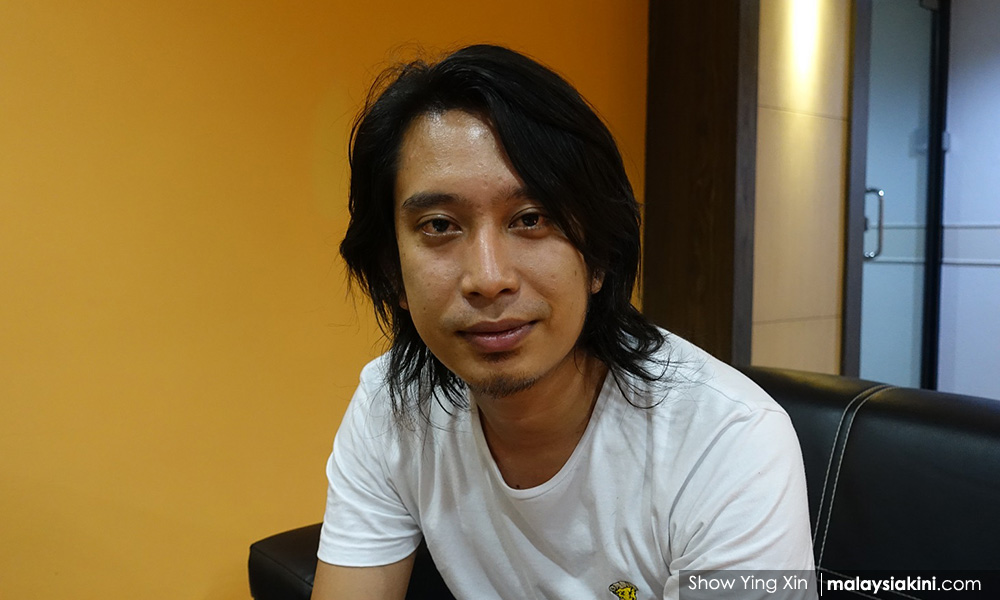
Calls for “Bebas Adam” (free Adam) were soon spread around the country, adding to people’s frustration towards the election results.
“I remember, I was the first to get arrested after the election.
“We knew something was wrong. We were not going to just accept the results…On May 13, I spoke out, condemning the results of election, and condemned the attitude of government who said the results were due to a ‘Chinese tsunami’,” he said.
The former Sultan Idris University of Education (UPSI) undergraduate was found guilty of giving a seditious speech, and was sentenced to 12 months’ jail by the Kuala Lumpur Sessions Court.
However, the Kuala Lumpur High Court substituted the jail term with an RM5,000 fine, with the case still in court today after several postponements.
Already a father
Today, Adam is already a married man. And a father too, with a child being born just last month in Penang.
“Yes, in the end the problems of the middle class are now affecting me!” he joked.
“Last time, most of my money was spent on traveling, going here and there to meet people. But now, while I still travel to Kuala Lumpur for court cases, I also have to buy diapers.”
“The economic pressure on the youth is real, but it doesn’t really affect me all that much, because I already got used to not having much money,” he said.
Adam had been actively involved in student movements since 2010, advocating for the abolishment of the higher education fund PTPTN and the University and University Colleges Act 1971.
He was suspended indefinitely by Universiti Pendidikan Sultan Idris in 2013 after bringing down a banner with the image of Prime Minister Najib Abdul Razak at the Umno headquarters.
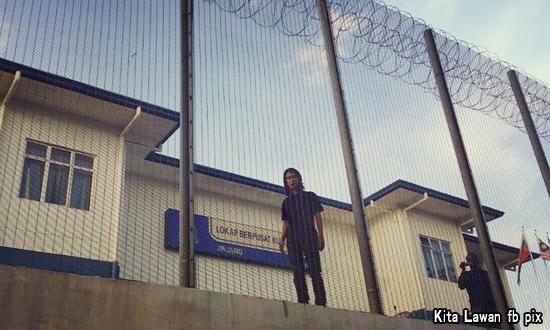
He still clearly remembers that during the campaigning period of the last election, he gave speeches almost every night at opposition rallies.
“Everything was in its the right place. You had people you’d never believe would sit together fighting against one common enemy.
“There was no confusion, the goal was so clear. People were confident.
“This kind of environment encourages people to think positive about politics, but now, politics has become confusing. Enemies become friends, friends become enemies.”
On May 5, 2013, Adam went back to Penang to vote, and rushed to Kuala Lumpur in a buoyant mood. He was to be left disappointed.
Harapan going backwards
Commenting on the current political situation, he opined that Pakatan Harapan are going backwards from what they achieved during in Pakatan Rakyat.
“Pakatan Rakyat was not a marriage made in heaven of course, they had all kinds of people. But somehow it was appealing. The idea and image were there.
“Harapan no longer captures the imagination of people, they no longer talk about things that paint a picture of future, but only react to the here and now to show that they are better than BN.
“They should not be driven by the faults and weaknesses of the current government. Instead, they should be able to distinguish themselves from BN.
“When BN says six percent GST, you say zero percent. When BN says RM2.70 per litre of petrol, you say RM1.90.
“All that you are doing is showing people that you are the lesser of two evils. You are not appealing to the young, as you have no alternative vision and a clear goal for the future.”
Currently working as a coordinator for Penggerak Komuniti Muda (Peka), a Penang government initiative, Adam encourages local youth to participate directly in their own communities, like providing free tuition to children or healthcare services.
Given the common belief that rural folks are conservative, Adam said what urban youth can do is go back to their hometowns and work to change the mentality and social fabric of the communities there.
“To deconstruct something is easy, the difficult part is to reconstruct it. What to do after something is deconstructed is your responsibility.
“You don’t just do it to prove a point. ”
Liang Tian Shen (31, Johor Yellow Flame exco member)
State: Pengkalan Rinting ; Parliament: Pulai, Johor
State: Pengkalan Rinting ; Parliament: Pulai, Johor
Like many born and raised in Johor, Liang Tian Shen has been living in Singapore for some time. But he comes back to Johor Bahru often as he is currently an exco member of the NGO Johor Yellow Flame.
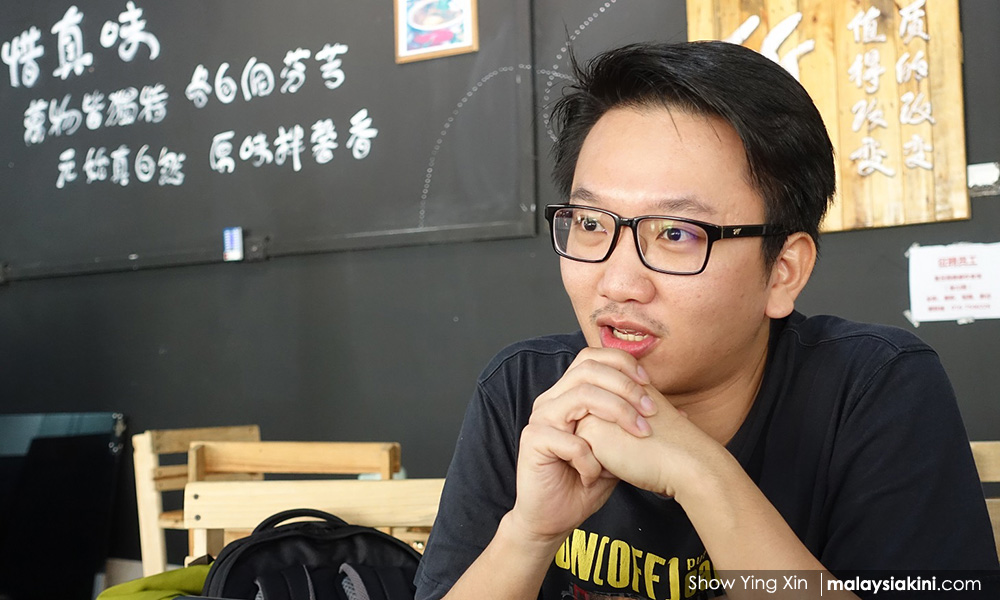
JYF used to be a netizen group which gathered Johorians for rallies and other solidarity get-togethers around the country. After the last election, Tian Shen and the other members of JYF have been working hard to transform it into a forum for civic education and discussions.
Tian Shen works in the field of solar energy, while pursuing his PhD part-time at the National University of Singapore.
Since 2011, he has participated in many rallies such as Bersih, Anti-Lynas, Kill the Bill and protests against the oil refinery in Pengerang.
“I joined JYF as a participant and now I am one of the organisers. I felt that my social skills have improved, as I can speak to a thousand people now without fear. This could be considered as my personal growth.”
During the last GE, some JYF members called upon Malaysians in Singapore to go back home to vote. Tian Shen responded by holding a placard reading “Jom Balik Undi” at the Jurong East Bus Interchange, one of the main stations going to and from Johor.
Some members were questioned by onlookers on why Malaysian politics was brought into Singapore.
“During the last election, I was very confident that the regime would change,” Tian Shen said.
“I believed in ‘ini kalilah’, thinking that if we couldn’t change the government at that time, Malaysia would have no future.”
Long-term social engagement
On voting day, Tian Shen waited impatiently for the results. He went back home happily after knowing that the opposition won many seats.
But upon hearing the final results, he was heartbroken.
“It was like missing a single number in a lottery, after buying the same number for many years!”
After the 2013 elections, many JYF members were in low spirits. Those who used to line the streets for their flash mobs never turned up again.
In its heyday, JYF could gather enough people for 10 coaches to for Bersih rallies. These days, filling even one is a stretch.
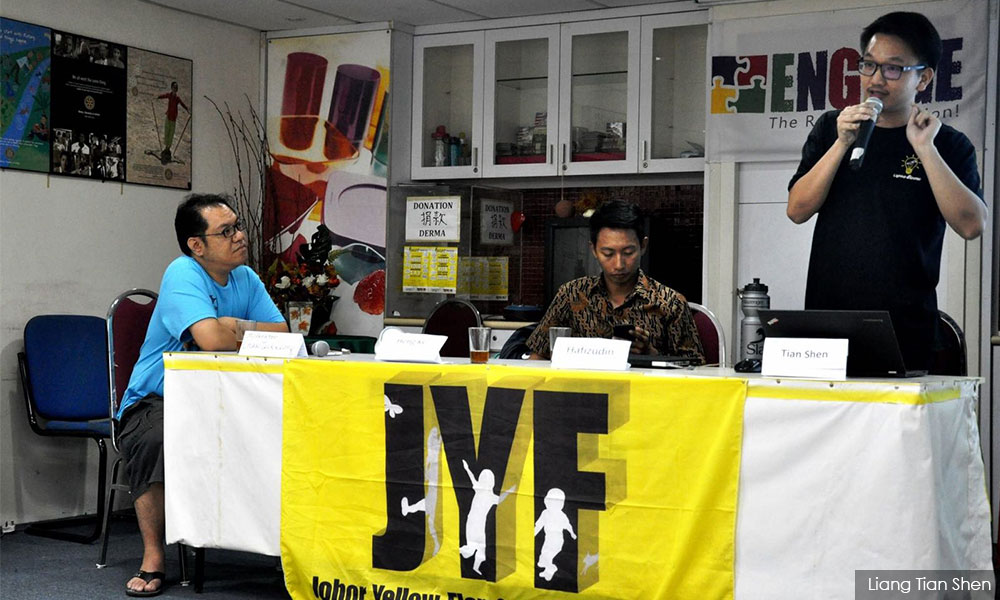
In spite of that, Tian Shen continues to participate in social movements, but in a different way. A trip to Borneo made him rethink what a social movement actually is.
He joined Light Up Borneo, a small NGO dedicated to bringing electricity to rural areas there. He then found out that only long-term community engagement can bring real change, not one-off rallies.
And that in turn, changes in disparate communities may not be enough to bring about a change in government.
From that point, he and JYF members have been organising talks, forums and film screenings, addressing issues like human rights, environment, gender equality, gender violence, refugees, and more.
Casting doubt on Harapan
What concerns Tian Shen the most about the next election is people’s expectation of the future.
“What do people believe they can achieve simply by voting out the government?
“I cast my doubts on Harapan, they are only sneering at the ruling party’s faults, but we can’t see their political agenda and direction.
“If such opposition parties want support, they can only rely on those who are easily agitated by propaganda. Like-minded citizens are thinking about whether they should give Harapan a chance.
“For me, I am still considering whether I support a change of government. I even considered abstaining from voting as an option. I am still observing Harapan’s performance.
He emphasised that party politics is just one of the many factors that generates a democratic process, saying that there is still much that needs be done.
Sharifah Nursyahidah (29, university lecturer)
State: Inanam; Parliament: Sepanggar, Sabah
State: Inanam; Parliament: Sepanggar, Sabah
Sharifah Nursyahidah, who is of Pakistani and Sino-Kadazan descent, and lived in Kota Kinabalu before moving to the peninsula for her Master’s.
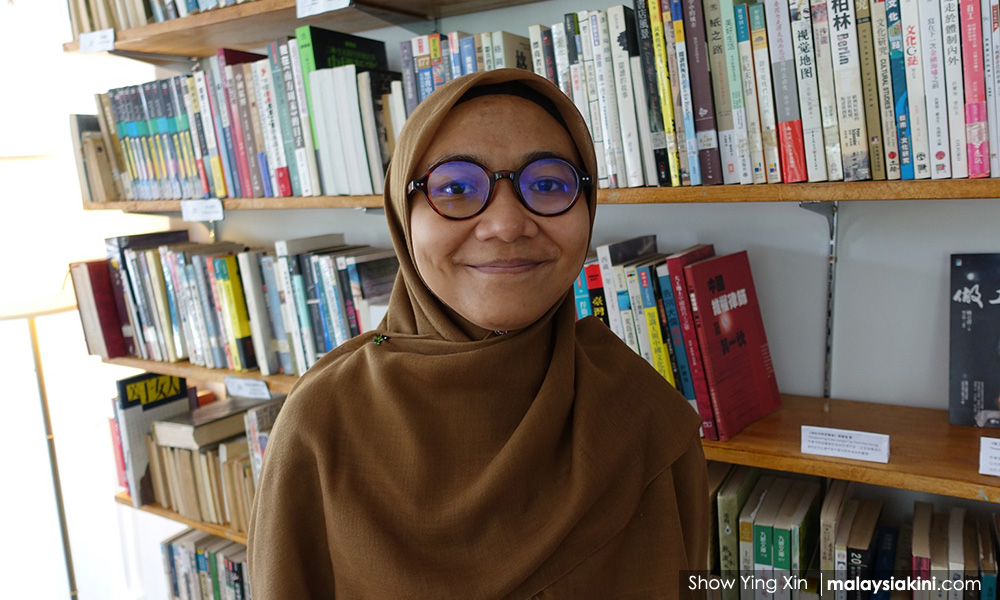
Sharifah was a member of Buku Jalanan KK, and once worked with a local NGO dealing with the issue of stateless children in Sabah.
After moving west in 2012, she met with the Committee for a Workers' International (CWI) - a Trotskyist organisation first established in the UK in 1974 – and subsequently joined its Malaysian division, called “Sosialis Alternatif.”
During the last election, despite being a poor student, Sharifah still bought a flight ticket back home to vote. She also wrote an article urging Sabahans to cast their votes for change.
“However, after the election I found that the two coalitions (BN and Pakatan) are of the same character, they is little difference between them.
“I have even less confidence for the local parties in Sabah, many are opportunists who jump parties once they fail in elections.
“And their agenda has always been the same: Sabah nationalism, against Project IC, promoting hatred towards the federal government…
“They have no significant issues; when they talk about racism in Sabah, they tend to whip up hatred for undocumented migrants. But I think these migrants have the rights to live in Sabah,” Sharifah said.
Opposing capitalism
In 2015, Sharifah wrote an article criticising Sabahan parties who organised a rally on May Day.
Their objective was to promote Sabahan autonomy, but for Sharifah, May Day should only be about workers’ rights. Unsurprisingly, this drew a lot of criticism from locals.
Sharifah emphasises that she is all for self-determination, but wonders who is going to govern Sabah were it to gain autonomy. And more importantly, how.
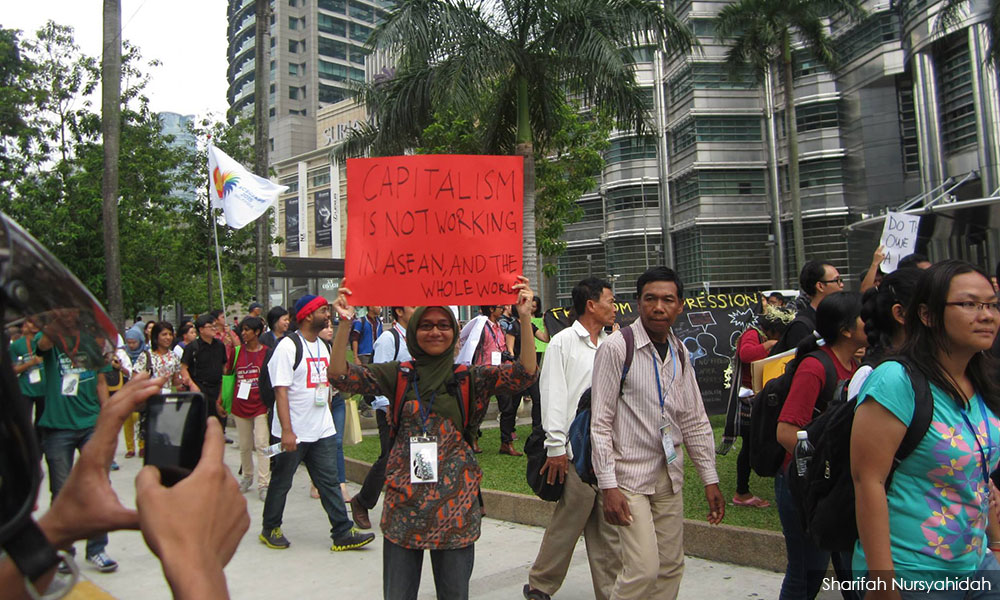
“I strongly oppose capitalism,” she stressed.
She and her partners from Sosialis Alternatif believe that they should intervene in any kind of politics to convey the right message.
“Some young people misinterpret politics in Malaysia. They thought the opposition could replace the government, they campaigned for the opposition in the last election, and now their energy has been drained.
“That’s why they feel frustrated and don’t want to vote.
“If the youth can think about intersecting politics with socialism, they will know that most political parties are equipped with a neoliberal agenda.
“But the most critical issue is democracy, this is the first thing,” she said.
Say no to iconism
Commenting on current student activism, she said student activists in the 1970s would not practice iconism. But not now.
“They move forwards as icons, but not charting the agenda as youth or students. That is why some decided to join parties after graduation.
“It’s not wrong to join parties, but it shouldn’t be about being an icon. If student activists are independent, they can criticise both parties. But if you are in one party, you have to support your its ideology.
Sharifah now lectures in political science, and plans to pursue her PhD degree in the near future. She conceded, however, that a young Muslim woman who talks about politics will always get on people’s nerves.
“They will think that your opinions are subversive,” she noted, adding that more women should become involved in politics.
Low Watan (33, video editor)
State: Jelapang; Parliament: Batu Gajah, Perak
State: Jelapang; Parliament: Batu Gajah, Perak
Low Watan studied anthropology in Taiwan for eight years before coming back to Malaysia in 2014.
After the Bersih 2 rally in 2011, many Malaysians in Taiwan began to organise solidarity activities in Taipei, such as protests for Kill the Bill and Anti-Lynas. Watan was one of the many participants.
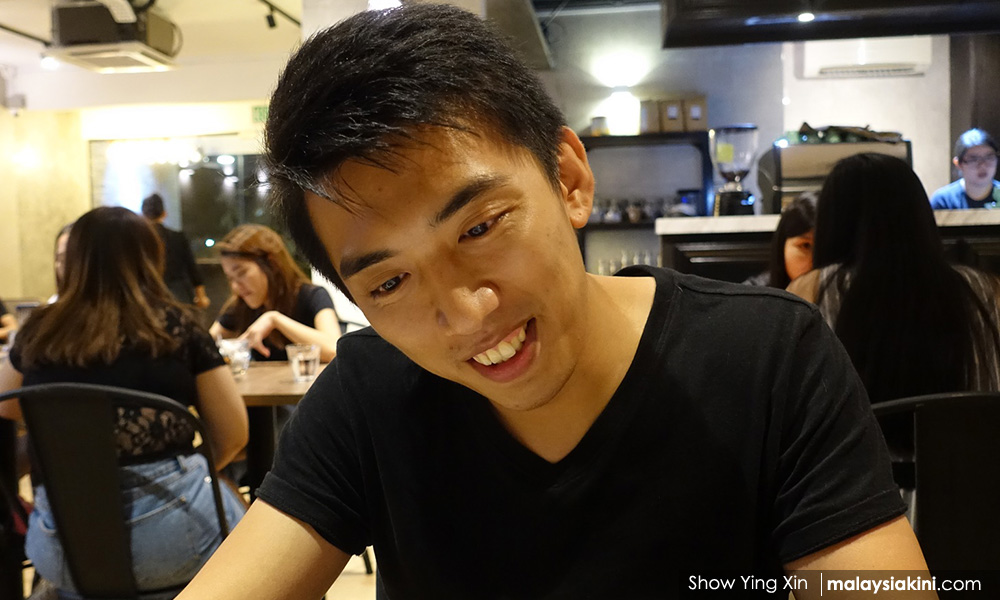
He and some friends decided to resume publication of “Malaysian Youth” in 2013, a magazine founded in 1983 by Malaysian students in Taiwan to promote academic discourse to serve the nation.
In the last election, Watan helped with overseas voting for Malaysians in Taiwan. He said many students were first-time voters who weren’t sure about the procedure, so he and friends coordinated the application process. They even made infographics and guides to explain how overseas voting works.
They also helped many students residing outside Taipei to travel to the capital to cast their vote on April 28, 2013, when advanced voting took place.
‘Jom Balik Undi’
Watan is proficient in video production, so he was also involved in producing videos for major rallies, as well as a “Jom Balik Undi” (Come home to vote) promotional video, which involved over a hundred Malaysians.
“Some poor students who were suspicious of the overseas voting system, scrounged and saved to buy flight tickets back home to vote.
The election result was, of course, not what they expected. Watan followed the election news in his hostel in Taitung on May 5, and his mood shifted from excitement to worry, and eventually to disappointment.
Although he knew that changing the regime would never be easy, he lamented the fact that gathering such explosive energy again would be near impossible.
Taiwan’s democratisation
The democratisation process in Taiwan became a reference point, said Watan, given its tragic and difficult history of moving from an authoritarian regime to democracy.
“I know that democratisation is a gradual process, it relies on breakthroughs over several generations. So I don’t take short-lived passion very seriously, and I don’t believe wholly in party politics.
“Democratisation is not only about voting every five years.
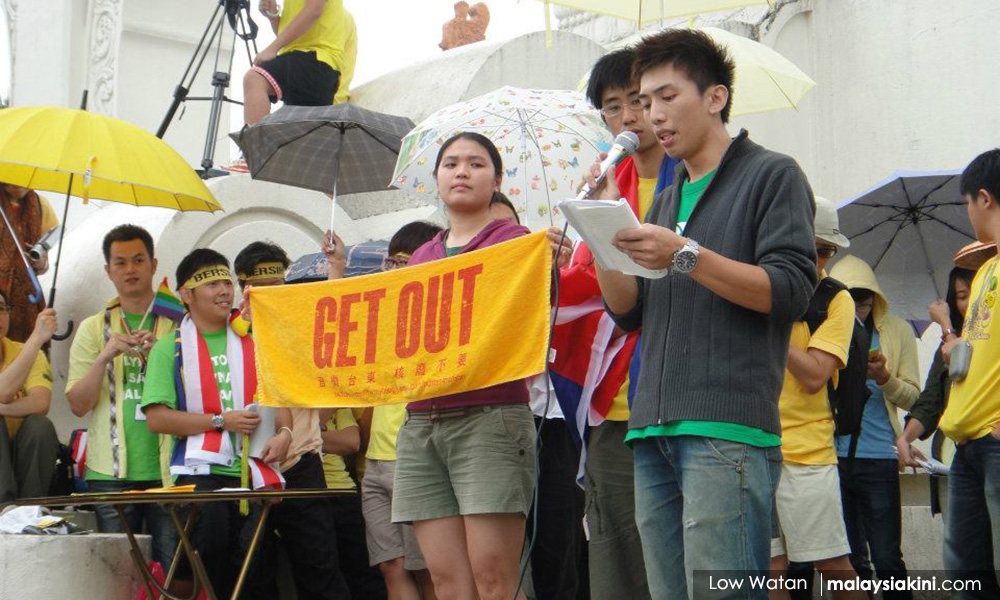
“After the last GE, many realised that the opposition could not provide a fresh and comprehensive alternative political agenda, so I don’t have much hope for the next GE,” Watan admits.
“I only hope that BN will be denied a two-thirds majority, and that a third force can arise.”
Watan said that he is “fortunate” to have a third choice in his state assembly seat, with Parti Sosialis Malaysia deciding to field candidate in Jelapang again.
But he understands that many progressive youth are forced to cast a “tearful” vote against BN, and not, symbolically, for the opposition.
“But after this, let’s continue to manage day-to-day democracy, something more concrete and solid.”
Maryam Lee (25, Projek Dialog member)
State: Kota Damansara; Parliament: Subang, Selangor
State: Kota Damansara; Parliament: Subang, Selangor
Maryam scoffs at people who want to educate her about voting being a civic responsibility.
She did not get a chance to vote in the last election, because her 21st birthday was on April that year, making it impossible for her to fulfil her “civic obligation” four years ago.
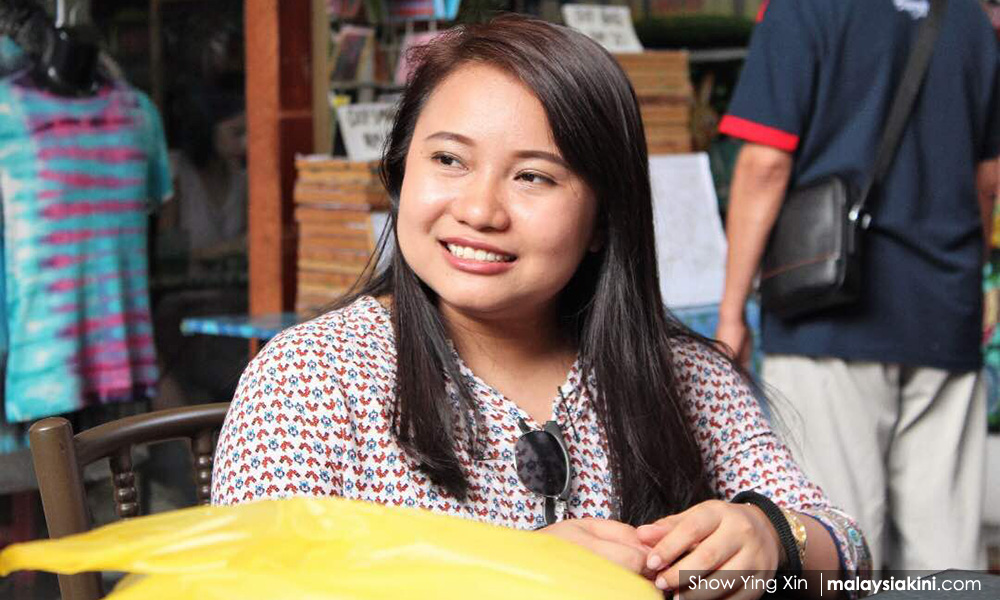
Despite being a somewhat older “first-time voter” this time around, she nevertheless is not all too excited.
“Political culture should not be centred on voting. Every time the youth want to talk about politics, we feel that it is only when our votes start to matter that we are taken seriously.
“Do our rights as citizens stop when we don’t vote? It doesn’t,” she said.
“So when people say ‘to enjoy your rights as a citizen you have to vote,’ it is ridiculous, because there are so many reasons why people don’t vote. They might be below age, like I was.
“Does it mean that only when we can vote, our identity and our service to the country matters? The narrative is very damaging, and it’s very exclusive and divisive.”
Maryam became active in the student movement while studying at Universiti Teknologi Mara in Shah Alam. She and friends started the “Occupy UiTM” movement in 2012, and practiced direct democracy in their discussion.
“We talked about a lot of issues, such as the unfair campus elections, and even boycotted it. Any motions brought to the Occupy movement were debated among everyone, and only passed when 100 percent agreed upon.
Maryam, who was also an active member of Buku Jalanan Shah Alam, is attracted to leftist ideas.
Along with a few friends of a similar political inclination, they hope to revitalise the core tenets of being Left – upholding social justice, and opposing racism and capitalism.
Maryam is now a core member of Projek Dialog, a forum that unpacks controversial issues, such as sexual orientation and religion.
Election is just one thing
Commenting on the general feeling of disillusionment among youth towards the coming election, Maryam said that she has never had much hope for the entire process.
“The last general election and the UiTM campus election got me started on my political activism. You get dragged into it, but the election narrative cannot sustain you.
“I am more concerned about the democratic process as a whole, not just the electoral system,” Maryam said.
“A lot of youth were dragged into the rhetoric of ‘ini kalilah’. At that time, generally, it wasn’t so appealing to me, and definitely not appealing anymore now.”
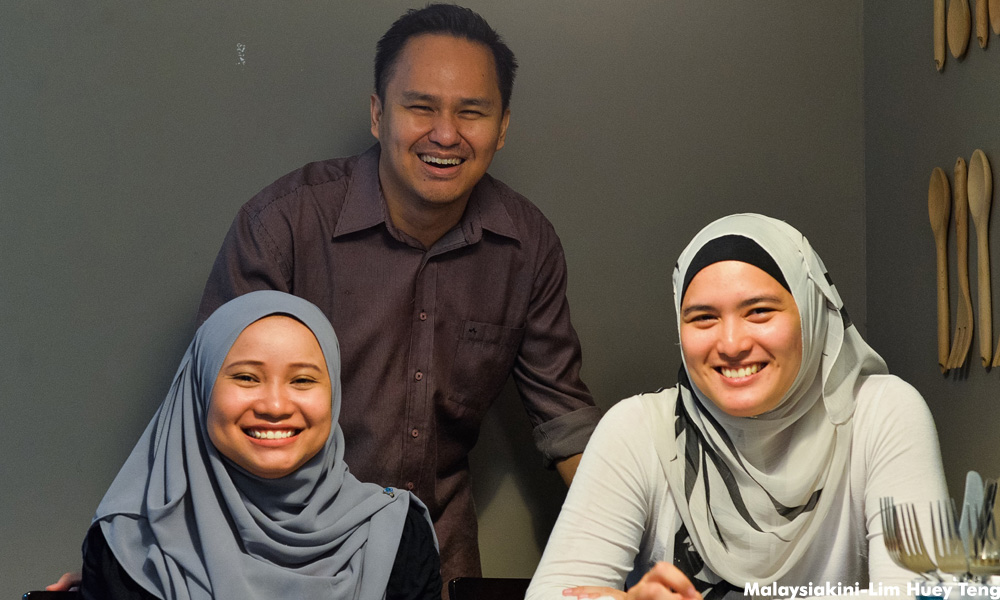
“I especially don’t like the idea of ‘asalkan bukan Umno’ (anything but Umno) because I don’t want Harapan to get free votes just because BN is terrible. A lot of young people are very matured in their thinking, don’t underestimate them.
“The election is not a major component of a democratic culture. A democratic culture should be a culture where you are involved in nation-building with or without elections.”
Using culture to intervene politics
Maryam opined that people do not see how the social fabric is going to change even if they vote for the opposition.
“Both sides are pro-establishment, they are using the same rhetoric of hate and race. And the opposition just won’t stop with (the) 1MDB (issue).”
“None of them take a stand against religious fundamentalism, because they don’t want to be seen anti-Islam; none address income inequality and social security in general,” she said.
Class and gender issues are also overlooked, Maryam added, noting that Malaysia used to have two women ministers in the Cabinet in 1960s, and half a century later, the number has only increased to three.
How then to stir up obvious but oft-overlooked issues? Maryam emphasised the importance of cultural intervention, using books, films and discussions to challenge social taboos and dominant discourses.
“We have to talk about things that people don’t see,” she said.- Mkini



No comments:
Post a Comment
Note: Only a member of this blog may post a comment.